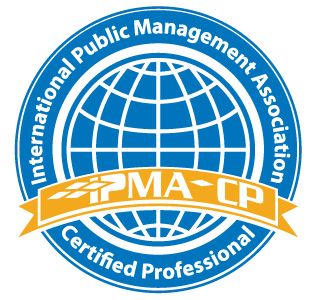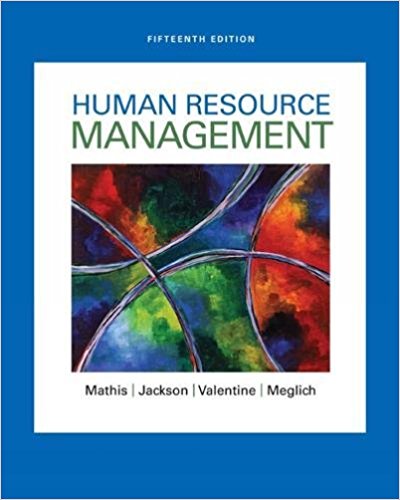
Course List
This course is open from May 14, 2024, to August 13, 2024.
Welcome to the PSHRA Public Sector HR Essentials Program!
The course is designed to meet the unique needs of the public sector HR professional.
 Do you want to become an IPMA-HR Certified Professional (IPMA-CP)?
Do you want to become an IPMA-HR Certified Professional (IPMA-CP)? Look no further as you have come to the right place!
This is a public sector focused credential for qualified HR professionals in an entry-or mid-level career position.
As a foundational course, the Public Sector HR Essentials Program covers all the major areas of a public sector human resources operation outlined in the following eight modules:
- Public Sector HR Basics
- Recruitment
- Selection
- Classification/Compensation
- Benefits
- Labor and Employee Relations
- Equal Employment Opportunity & Diversity
- Organizational Development
Engage with your Classmates:
You are required to comment on at least two of your classmates post for each assignment and attend at least 2 of the 3 Q&A sessions (via Zoom). The Q&A schedule will be sent to you separately via e-mail.
Please click on the "Course Materials" tab above to download the following materials:
- Course E-book
Provided in a flexible online format, you can expect to complete each module at your pace over a period of 2 weeks (unless marked accelerated). You will benefit from the expertise of top public sector HR professionals who understand the unique issues, challenges and opportunities of human resources in the government environment.
Upon completing all 8 modules, you will receive a certificate of completion and are one step closer to IPMA-CP certification.
IPMA-CP Certification: Upon conclusion of Module 8, after completing all the exercises and attempting the practice exams, you will automatically receive a certificate of completion. This does NOT confirm IPMA-CP certification. At the beginning of the course, an exam declaration was provided to state whether you wish to take the IPMA-CP certification exam. You will be asked to give acknowledgement at the beginning of the exam, which states the exam is closed book and copyrighted.
Certification Exam: The IPMA-CP exam can be accessed as part of your course package under "IPMA-CP Exam". You must activate your exam with the green "Activate" button as of the last day of the course. Once activated, your 45 day window to study and take the exam will begin. Should you let the 45-day period lapse, there will be an additional $100 fee to test (subject to change). You will login to https://learning.ipma-hr.org to view your exam as you did with your course.
As a foundational course, the Public Sector HR Essentials Program covers all the major areas of a public sector human resources operation outlined in the following eight modules:
Module 1: Public Sector HR Basics
Module 2: Recruitment
Module 3: Selection (Accelerated - 1 week)
Module 4: Classification and Compensation
Module 5: Benefits (Accelerated - 1 week)
Module 6: Labor and Employee Relations
Module 7: Equal Employment Opportunity & Diversity
Module 8: Organizational Development (10 days)
Provided in a flexible online format, you can expect to complete each module at your pace over a period of 2 weeks unless marked differently. You are required to comment on at least two of your classmates post and attend at least 3 of the 4 Course Check-in Meetings. You'll benefit from the expertise of top public sector HR professionals who understand the unique issues, challenges and opportunities of human resources in the government environment.
Accelerated Course Schedule and Syllabus:
(please read this ENTIRE page for important course information and dates)This course was designed specifically for new Human Resource professionals, or those seeking knowledge of other HR disciplines outside of their normal work assignments. The course will cover all of the major areas within a full-functioning Human Resources operation. The information presented is intended to provide a working understanding of each of the following disciplines:
- Public Sector HR Basics
- Recruitment
- Selection
- Job Classification and Compensation
- Employee Benefits
- Labor and Employee Relations
- EEO and Diversity
- Organizational Development
The course is divided into the eight subject areas, or Modules, listed above. Where appropriate, we have included cross references to material or information contained in other Modules. This reflects the inter-relatedness of each of the functional disciplines within the HR umbrella.
Materials used as part of this course include:

Human Resource Management, Fifteenth Edition (14th Edition will also work)
Robert L. Mathis and John H. Jackson (must be purchased separately)At the beginning of each module, we have listed the reading assignment from the Mathis and Johnson textbook, which is the main text for this course.
This online course provides a number of benefits to participants:
- Flexibility in completing class assignments on YOUR schedule, with the freedom of location and time of day;
- Opportunity to interact with other HR professionals from around the country;
- Addresses the needs of all types of learners, and those reluctant to speak in groups are drawn more readily into the discussions.
Engage with your Classmates:
You are required to comment on at least two of your classmates post for each assignment and attend at least 3 of the 4 Course Check-in meetings (via Zoom). The Q&A schedule will be sent to you separately via e-mail.
 Module 1: Public Sector HR Basics
Module 1: Public Sector HR Basics (Suggested Study Time: 2 weeks)
This module provides an overview of the HR function in public organizations, and includes:
- Understanding the differences between public and private sector HR operations;
- History of laws that have affected the development of the public sector HR function;
- Review of the major laws and regulations that govern HR operations;
- Roles and responsibilities of HR professionals in organizations;
- Discussion of typical organizational structures;
- Use of Information Technology to enhance HR operations;
- Strategic HR operations;
- Professional HR Organizations;
- Importance of Ethics in HR.
 Module 2: Recruitment
Module 2: Recruitment(Suggested Study Time: 2 weeks)
- Role of workforce planning;
- Planning and utilizing recruitment strategies;
- Executive recruitment strategies;
- Long term recruitment strategies;
- Importance of background and reference checks;
- Negotiating with selected candidates;
- Importance of evaluating recruitment strategies.
 Module 3: Selection
Module 3: Selection(Suggested Study Time: 1 weeks)
- Selection in the public sector;
- Merit system considerations;
- Typical selection methods;
- Test development and design;
- Test administration considerations;
- Scoring methodologies;
- Use of preference points;
- Use and management of eligible lists;
- Other qualification considerations.
 Module 4: Job Classification and Compensation
Module 4: Job Classification and Compensation
(Suggested Study Time: 2 weeks)
- Applicable laws and regulations that govern job classification activities;
- Concepts and principles of job classification;
- Job analysis techniques;
- Classification processes;
- Methods for establishing classification relationships;
- Importance of classification strategies to other HR disciplines.
- Translating classification into compensation;
- Pay for performance;
- Executive compensation;
- Importance of compensation strategies to other HR functions.
 Module 5– Employee Benefits:
Module 5– Employee Benefits:(Suggested Study Time: 1 weeks)
- Benefits terminology;
- Types, characteristics, and funding of benefits;
- Selection and negotiation with providers;
- Budget and cost control;
- Applicable laws that govern benefit plans;
- Retirement Plans;
- Importance of benefits strategies to other HR functions.
 Module 6– Labor and Employee Relations:
Module 6– Labor and Employee Relations:
(Suggested Study Time: 2 weeks)
- Applicable laws and regulations that govern labor/employee relations activities;
- Bargaining units;
- Collective bargaining models;
- Forms of collective bargaining agreements;
- Work interruptions/stoppages;
- Laws and regulations that affect collective bargaining processes;
- Discipline procedures;
- Grievance administration and arbitration;
- Labor/management relations.
 Module 7 – EEO and Diversity:
Module 7 – EEO and Diversity:
(Suggested Study Time: 2 weeks)
- Laws that govern EEO and Diversity strategies;
- Regulatory/oversight agencies;
- EEO concepts and employer’s policies;
- EEO Uniform Guidelines and selection policies;
- Discrimination complaints, investigations, and resolution;
- Reasonable accommodations;
- EEO reports and monitoring;
- Importance of diversity programs to other HR functions.
 Module 8 – Organizational Development:
Module 8 – Organizational Development:
(Suggested Study Time: 10 days)
- Organizational culture and change strategies;
- Employee development;
- Performance management;
- Progressive discipline and counseling and coaching;
- Application of organizational development strategies to succession planning.
Expected Course Completion Date: July 23, 2024.
Please note: Your IPMA-CP exam must be activated prior to July 23, 2024.
Course Check Dates (Subject to Change:
- Course Check-In 1:
- Course Check-In 2:
- Course Check-In 3:
- Course Check-In 4:
IPMA-CP Certification Exam:
Upon completion of the course, you will be able to download your certificate of completion after finishing Module 8. The certificate of completion is not your official certification credential. Passing the IPMA-CP certification examination is required to become IPMA-CP certified.
The IPMA-CP certification exam is included as part of the course package-2nd item. The exam is administered online in this platform. When you are finished with the course (required) and ready to take the exam, there is a green "Activate" button to click on. Only click on the green "Activate Button" when you are ready to activate the 45-day window.
This course is open from June 4, 2024 - July 12, 2024
Syllabus: Public Sector HR Executive Leadership Certificate Program
Start Date: June 4, 2024
End Date: July 12, 2024
Instructor: Mary Rowe
PSHRA Contact: Debbie Tankersely-Snook, tankersely@pshra.org
Welcome:
Welcome to PSHRA's Public Sector HR Executive Leadership Certificate Program. This course will enhance your HR public sector leadership skills and help you develop targeted initiatives to improve your agency.
Course Outcomes
This course is designed to help you build your HR competencies and help you strategically position HR as a transformative business partner and leader in the organization.
To achieve this, the course focuses on 3 related areas:
- Your skill set in the 4 HR Lenses: business acumen; innovation; strategic orientation; and diversity, equity, inclusion, and accessibility. As part of this course, you will build a personal development plan for these competencies.
- Your skill set in the HR Areas of Focus: leadership, culture, talent, technology, and communication. You will build a personal development plan for these competencies as well.
- Finally, you'll learn strategies for building, presenting, and gaining buy-in for the initiatives you develop to improve how HR is positioned within your agency.
You will finish this course with:
- a personal professional development plan,
- actions you will take to improve how HR is positioned within your agency.
Certificate:
You will earn a Certificate of Executive Leadership from PSHRA with your successful completion of both the online lessons and cohort session.
You may have attended an Executive Leadership in-person course. Welcome! This learning experience will complement and enhance the material from that program and provide additional support as you build your leadership expertise.
Course Design:
This course includes six lessons that you'll take online and three cohort sessions where you'll meet with peers also taking this course. The online lessons will give you an opportunity to assess your development opportunities; teach important concepts, principles, and practices; and will help you begin planning improvement initiatives. Explore the course interactive elements and links to outside references to get the most out of the course. The cohort discussions will give you an opportunity to share ideas and learn from your peers. In the cohort discussions you will further develop and refine the improvement plans you draft in the online sessions.
Time Commitment:
The more dedicated time and effort you put into this course the more you will get out of it.
To read the material, complete the activities, and prepare for the cohort discussions, consider scheduling 60 - 90 minutes for each lesson. Try to take the lesson at least several days before the cohort discussion - to give yourself time to reflect on what you have learned and the plans you have developed.
Cohort Schedule (Subject to Change):
Cohort # 1 – To Be Determined
Cohort # 2 – To Be Determined
Cohort #3 -- To Be Determined
Week 1:
Online Lesson (self-paced)
Lesson 1: Introduction
Course Introduction.
Week 2:
Online Lesson (self-paced)
Lesson 2: Assess Your Skills Through the Critical Lenses
Learn more about business acumen; innovation; strategic orientation; and diversity, equity, inclusion, and accessibility.
Cohort Session (virtual)
Session 1: Introduction and Assess Your Skill Set
Reviewing and discussing the content from the first two lessons.
Week 3:
Online Lesson (self-paced)
Lesson 3: Assess Your Skills Through the Areas of Focus
Learn more about leadership, culture, talent, technology, and communication.
Week 4:
Online Lesson (self-paced)
Lesson 4: Your Role as a Trusted Advisor
Learn about executive presence, leading with empathy, and how to build trust to drive collaboration.
Cohort Session (virtual)
Session 2: Area of Focus Skills and Being a Trusted Advisor
Reviewing and discussing the content from the third and fourth lesson.
Week 5:
Online Lesson (self-paced)
Lesson 5: Creating a Personal Development Plan
Take all that you've learned in the online lessons and cohort sessions and create a personal development plan.
Week: 6
Online Lesson (self-paced)
Lesson 6: Leveraging Your Skills
Create a plan to influence agency strategy and short-term projects based upon the skills learned in this course.
Cohort Session (virtual)
Session 3: Personal Development Plan and Leveraging Your Skills
Reviewing and discussing the content from the fifth and sixth lessons.
Course Workbook:
The course includes a workbook. You'll use the workbook throughout the course to reflect on what you're learning, record ideas, plan for future personal development, and plan activities for your agency. There are two versions:
- a PDF version - if you'd like to print it and write your answers and ideas and
- an MS Word version - if you'd prefer to work electronically.
The files have the same content - just differences in page layout. You will use the workbook while taking the online lessons and while attending the cohort sessions.
The workbook is available by selecting the Course Materials tab and then Executive Leadership Workbook
| Access Date | Quiz Result | Score | Actions |
|---|


